Guinea Worm Disease Reaches Brink of Eradication Provisional counts indicate fewer than 2,000 cases of Guinea worm disease will remain in the world when 2010 ends, down from 3.5 million cases in 21 countries spread across Asia and Africa when the international eradication campaign led by The Carter Center began in 1986. Southern Sudan harbors more than 96 percent of the remaining cases worldwide, but from January to September 2010, only 1,549 cases were identified, compared to 2,523 cases over the same period in 2009.
Watch the video "Countdown to Zero" to learn more about the impact of this historic effort to make Guinea worm the second human disease eradicated from Earth > 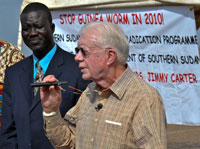 Observers Witness Historic Elections in Sudan, Cote d'Ivoire, and Guinea In April, The Carter Center observed Sudan's first elections since 1986. Enormously complex, with about 15,000 individuals running for office and requiring eight separate ballots in the north and 12 in the south, the elections were a huge undertaking, with Center observers covering more than 1,000 different polling sites staffed by more than 100,000 poll workers. Though far from perfect, the elections were relatively peaceful, calm, and orderly, giving this war-torn nation a much-needed opportunity to move toward permanent peace and strengthen its quest for true democracy. They were critical in setting the stage for the January 2011 referendum in Southern Sudan, where the people will cast an important vote on self-determination.
Observers Witness Historic Elections in Sudan, Cote d'Ivoire, and Guinea In April, The Carter Center observed Sudan's first elections since 1986. Enormously complex, with about 15,000 individuals running for office and requiring eight separate ballots in the north and 12 in the south, the elections were a huge undertaking, with Center observers covering more than 1,000 different polling sites staffed by more than 100,000 poll workers. Though far from perfect, the elections were relatively peaceful, calm, and orderly, giving this war-torn nation a much-needed opportunity to move toward permanent peace and strengthen its quest for true democracy. They were critical in setting the stage for the January 2011 referendum in Southern Sudan, where the people will cast an important vote on self-determination.
Read the Center's Sudan election statement >
In West Africa, The Carter Center was the only American nongovernmental organization observing historic presidential elections and runoffs in Guinea and Cote d'Ivoire in 2010, and among the few international observer groups present, our teams were deployed the longest and most extensively. These elections were the first openly competitive contests for both nations since the end of French colonial rule a half-century ago.
Watch our video blogs from the field: Voters Show Enthusiasm, Patience in Cote d'Ivoire Elections and Carter Center to Observe Historic Cote d'Ivoire and Guinea Elections Back-To-Back > 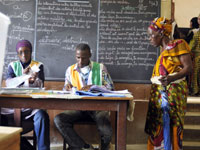 River Blindness Transmission Halted in Ecuador Ecuador reached a significant milestone in 2010 when the country joined Colombia to become the second in the Americas to halt transmission of river blindness. Ecuador's achievement is a vital step in the Carter Center's campaign to rid the southern hemisphere of this debilitating, preventable, fly-borne disease, which threatens a half-million people in the Americas. Seven of the original 13 endemic areas in Latin America have interrupted transmission of the disease, largely through health education and semiannual mass distribution of the drug ivermectin.
River Blindness Transmission Halted in Ecuador Ecuador reached a significant milestone in 2010 when the country joined Colombia to become the second in the Americas to halt transmission of river blindness. Ecuador's achievement is a vital step in the Carter Center's campaign to rid the southern hemisphere of this debilitating, preventable, fly-borne disease, which threatens a half-million people in the Americas. Seven of the original 13 endemic areas in Latin America have interrupted transmission of the disease, largely through health education and semiannual mass distribution of the drug ivermectin.
Watch the video about Ecuador's achievement and continuing health education there >
Read more about the Center's effort to stop transmission of river blindness in the Americas> 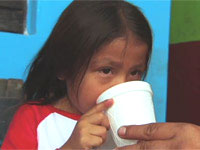 President Carter Negotiates Release of American in North Korea During a private humanitarian mission in August, former U.S. President Jimmy Carter gained the release of an American teacher imprisoned in North Korea for seven months. Aijalon Gomes had been sentenced to eight years of hard labor with a fine of about $700,000 for illegally entering North Korea. President Carter was invited by North Korean officials to go to Pyongyang to negotiate Gomes' release and was accompanied on the trip by a delegation from The Carter Center.
President Carter Negotiates Release of American in North Korea During a private humanitarian mission in August, former U.S. President Jimmy Carter gained the release of an American teacher imprisoned in North Korea for seven months. Aijalon Gomes had been sentenced to eight years of hard labor with a fine of about $700,000 for illegally entering North Korea. President Carter was invited by North Korean officials to go to Pyongyang to negotiate Gomes' release and was accompanied on the trip by a delegation from The Carter Center.
Read the Agence France Press story> (link no longer available)  New Program Tackles Lack of Mental Health Care in Liberia In 2010, The Carter Center launched the Liberia Mental Health Initiative, the Center's first on-the-ground international project designed to improve access to mental health care. Many Liberians suffer from trauma, depression, and other mental health issues following more than a decade of civil conflict. With only one psychiatrist and a handful of nurses with mental health training in the country, the Liberia Ministry of Health and Social Welfare asked the Center to help create training systems for mental health professionals, developing support systems for family caregivers, and work to reduce the stigma and discrimination often brought by mental illnesses.
New Program Tackles Lack of Mental Health Care in Liberia In 2010, The Carter Center launched the Liberia Mental Health Initiative, the Center's first on-the-ground international project designed to improve access to mental health care. Many Liberians suffer from trauma, depression, and other mental health issues following more than a decade of civil conflict. With only one psychiatrist and a handful of nurses with mental health training in the country, the Liberia Ministry of Health and Social Welfare asked the Center to help create training systems for mental health professionals, developing support systems for family caregivers, and work to reduce the stigma and discrimination often brought by mental illnesses.
Read blog: Jane Bigham of the Center's Mental Health Program reports from Liberia > 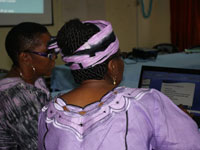 Access to Information for Africa's Citizens Advanced In February, former U.S. President Jimmy Carter led the Carter Center-sponsored African Regional Conference on Access to Information—the first of its kind ever held on the African continent. More than 100 participants from government, media, academia, and civic groups came to develop a plan for moving the case for access to information across Africa—a crucial necessity for a continent that had, at the time of the conference, only five nations with statutory right to information legislation, with some laws being used repressively and others not being implemented at all.
Access to Information for Africa's Citizens Advanced In February, former U.S. President Jimmy Carter led the Carter Center-sponsored African Regional Conference on Access to Information—the first of its kind ever held on the African continent. More than 100 participants from government, media, academia, and civic groups came to develop a plan for moving the case for access to information across Africa—a crucial necessity for a continent that had, at the time of the conference, only five nations with statutory right to information legislation, with some laws being used repressively and others not being implemented at all.
Learn more about the African Regional Conference on the Access to Information>
Read "Carter Center Congratulates Liberia on Passage of Freedom of Information Bill"> 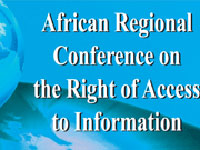 Innovative Program Treats and Tests Millions for Trachoma and Malaria The battle against blinding trachoma is slowly being won, and one of the Carter Center's most innovative strategies has been to integrate trachoma control efforts with our work to prevent malaria. Since 2008, Carter Center volunteers have delivered more than 26 million doses of azithromycin to prevent trachoma and tested and treated millions for malaria.
Innovative Program Treats and Tests Millions for Trachoma and Malaria The battle against blinding trachoma is slowly being won, and one of the Carter Center's most innovative strategies has been to integrate trachoma control efforts with our work to prevent malaria. Since 2008, Carter Center volunteers have delivered more than 26 million doses of azithromycin to prevent trachoma and tested and treated millions for malaria.
In November, the Center and its partners conducted the fifth MALTRA (malaria and trachoma) week, which alternates every six months between the eastern and western halves of Ethiopia's vast Amhara Region, where 17 million people are at risk of both diseases. By concentrating prevention work for two diseases at once into intense week-long efforts reaching millions of people, the Center saves tremendous amounts of money and time. With time saved, the Center has been able to continue the massive program of latrine building so important to keeping fly populations down and reducing the spread of trachoma. Almost 500,000 more latrines were built in Ethiopia in 2010.
Watch the video> 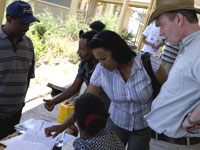 Andean-U.S. Dialogue Forum Launched The Carter Center—with the International Institute for Democracy and Electoral Assistance—launched a new multiyear initiative in early 2010 to address the historically difficult relations between the United States and the five Andean countries of Venezuela, Colombia, Ecuador, Peru, and Bolivia. With no topic considered off-limits, meetings were held in February in Atlanta, in June in Lima, Peru, and in September, in Washington, D.C. At year's end, Colombia and Ecuador restored full diplomatic relations, a bilateral effort facilitated for several years by The Carter Center.
Andean-U.S. Dialogue Forum Launched The Carter Center—with the International Institute for Democracy and Electoral Assistance—launched a new multiyear initiative in early 2010 to address the historically difficult relations between the United States and the five Andean countries of Venezuela, Colombia, Ecuador, Peru, and Bolivia. With no topic considered off-limits, meetings were held in February in Atlanta, in June in Lima, Peru, and in September, in Washington, D.C. At year's end, Colombia and Ecuador restored full diplomatic relations, a bilateral effort facilitated for several years by The Carter Center.
Learn more about the Andean-U.S. Dialogue Forum> 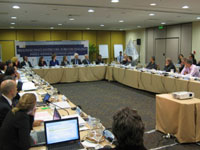 Former First Lady Puts Spotlight on Veterans' Mental Health Care Forums led by former First Lady Rosalynn Carter brought national mental health leaders together to shine a national spotlight on the unique challenges for mental health care and community reintegration faced by National Guard and reserve veterans returning from Iraq and Afghanistan. Speakers at the 25th annual Rosalynn Carter Symposium, "A Veteran's Journey Home: Reintegrating Our National Guard and Reservists into Family, Community, and Workplace" included Congressman Patrick Kennedy, (D-R.I.).
Former First Lady Puts Spotlight on Veterans' Mental Health Care Forums led by former First Lady Rosalynn Carter brought national mental health leaders together to shine a national spotlight on the unique challenges for mental health care and community reintegration faced by National Guard and reserve veterans returning from Iraq and Afghanistan. Speakers at the 25th annual Rosalynn Carter Symposium, "A Veteran's Journey Home: Reintegrating Our National Guard and Reservists into Family, Community, and Workplace" included Congressman Patrick Kennedy, (D-R.I.).
Watch Symposium video presentations: A Veteran's Journey Home> 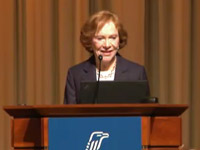 Center Launches Unique Elections Database The first Database of Obligations for Democratic Elections was created in 2010 by The Carter Center. Consolidating more than 150 different sources of international law related to human rights and elections, this searchable database gives both election observers and interested citizens a ready source of information they can use to assess the quality of a country's electoral processes.
Center Launches Unique Elections Database The first Database of Obligations for Democratic Elections was created in 2010 by The Carter Center. Consolidating more than 150 different sources of international law related to human rights and elections, this searchable database gives both election observers and interested citizens a ready source of information they can use to assess the quality of a country's electoral processes.
Read more about the Center's efforts to create standards for democratic elections and election observation or search the
database> 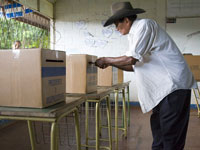
Please sign up below for important news about the work of The Carter Center and special event invitations.